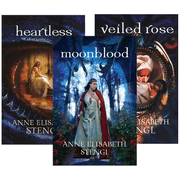 (posted both here and on The Worldsmith's Shelf)
(posted both here and on The Worldsmith's Shelf)Tales of Goldstone Wood by Anne Elisabeth Stengl
Imrelda rose and turned. "My prince?"
"I am here." Aethelbard stepped into the room. His clothing was worn and burned, his face lined with care. "I have come for my sword."
--Heartless
--Heartless
Princess Una of Parumvir has finally come of age and eagerly awaits the suitors who will come for her hand. But when the 12-Year Market brings Prince Aethalbard of Farthestshore out of Goldstone Wood, she is drawn into a greater adventure than she could have imagined.
Rejecting Aethalbard's proposal, she instead turns her attention to Leonard the jester, who turns out to be more than he seems. But when Parumvir falls under attack, Una must choose whether to accept the Dragon's kiss or call upon someone greater than herself.
As much as I love this story, I would classify it as fairy-tale, in the vein of George MacDonald, rather than fantasy, because of the dreamlike quality of the Wood and the nature of the plot. Not that it in any way reduces the beauty of the story--but some of the mysteries are more easily accepted if seen through that lens.
“Here are beauties which pierce like swords or burn like cold iron. Here is a book which will break your heart." C. S. Lewis's quote on the Lord of the Rings could equally apply to this book and all the Tales of Goldstone Wood (currently three, with a fourth releasing in November) Some of the scenes, like the quote listed above, stabbed with a cold, wild longing, what C.S. Lewis would call Northernness. Aethelbard is wonderfully mysterious and beautiful, and Una is so realistically drawn that I find myself sympathizing with her, where I might have been exasperated with others.
Veiled Rose
Her lips were red, her looks were free,
Her locks were yellow as gold:
Her skin was as white as leprosy,
The Nightmare Life-in-Death was she,
Who thicks man’s blood with cold.
The naked hulk alongside came,
And the twain were casting dice;
`The game is done! I’ve won! I’ve won!’
Quoth she, and whistles thrice
Includes spoilers for Heartless
Along with Death-in-Life, the mighty Dragon from Heartless, readers also encounter his sister, the feared Lady Life-in-Death. While her brother grants his victims a life little better than death, she gives them all their dreams, but in such a way it proves worthless. "All yours come to me in the end," the Dragon says to the Lady. These figures, inspired by "The Rime of the Ancient Mariner," prove critical to understanding the events of Veiled Rose, as well as throwing a further light on Heartless.
Readers finally learn the story of Prince Lionheart and his bargain with the Dragon on the day Southlands burned and what led him to that choice. When eleven years old and living at Hill House for the summer, he meets a veiled girl Rose Red, who is torn between dreams of the Dragon and the voice of her Imaginary Friend and lives alone on the mountain with her nanny goat Beana. When he sees her again, years later, her father is dead, so Lionheart takes her into his service to care to her. When the Dragon attacks, he escapes, but Rose Red begs to go back and care for his fiancee Daylily and the rest of his family.
Rose Red has a cameo appearance in Heartless, but not by name. Hidden behind her veils, her fierce devotion to Lionheart and her stubbornness sharply distinguish her from Una, but the mystery makes her intriguing and adds ambiguity to the Dragon's temptations. But her story, unlike Una's, doesn't end in her first book.
Moonblood
“I'll never tell you to stop loving. You see, I believe in hopeless love. Oh yes. I believe in it with all my heart, though you may discount the heart of an old nanny like me. For real love brings pain. Real love means sacrifices and hurts and all the thousand shocks of life. But it also means beauty, true beauty.
--Beana
(Minor spoilers for Heartless and Moonblood)
After five years under the Dragon's rule, Lionheart's return to Southlands is viewed with suspicion, especially with Rose Red at his side. When he banishes her to the Wilderlands, he unknowingly condemns her to return to the goblin realms, where enchantment veils the the truth. Eventually, compelled by guilt, he enters the realms in an attempt to atone for his wrong. But it will take more strength than he has to enter the lost realm.
I'll be honest, I did a lot of internal yelling during this book. Felix forgets his promise to Dame Imraldera (and ends up in deep trouble because of it); Lionheart refuses to admit his wrongs, and Rose doesn't admit she needs help, especially Lionheart's. But at the same time, all the yelling was because I loved them and didn't want them to suffer. Another great aspect of this story was all the aspects of Goldstone Wood we learn more about--enough to whet my appetite for Starflower, out this fall.















